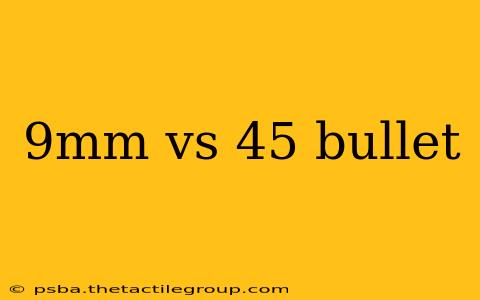Choosing the right caliber for self-defense or sport shooting is a crucial decision, often sparking passionate debates. This in-depth comparison of the 9mm and .45 ACP cartridges aims to provide a balanced and informed perspective, helping you understand the strengths and weaknesses of each. We'll delve into factors like stopping power, recoil, capacity, and cost, empowering you to make an educated choice based on your specific needs.
Stopping Power: The Central Debate
The age-old question: which caliber delivers a more effective "stopping power"? The answer isn't straightforward and often depends more on shot placement than sheer bullet size.
-
.45 ACP: The larger .45 ACP bullet boasts significantly more mass and diameter, resulting in larger wound channels. This translates to a greater potential for immediate incapacitation due to tissue damage and shock. Proponents often cite its "one-shot-stop" potential, though this is not guaranteed.
-
9mm: While smaller, the 9mm cartridge delivers a higher velocity and flatter trajectory, leading to improved accuracy at longer ranges. Modern 9mm ammunition, with advancements in bullet design (like jacketed hollow points), offers impressive stopping power, often rivaling the .45 ACP in real-world scenarios. The increased capacity of many 9mm handguns also allows for multiple shots, mitigating any potential shortcomings in single-shot stopping power.
Conclusion on Stopping Power: While the .45 ACP offers a larger potential for immediate incapacitation due to its size and mass, the 9mm's higher velocity, accuracy, and larger magazine capacity make it a very effective and arguably superior choice for many users. Effective shot placement remains the most critical factor in both calibers.
Recoil and Shootability
Recoil is a critical factor, particularly for novice shooters or those with less upper body strength.
-
.45 ACP: Known for its substantial recoil, the .45 ACP can be challenging for some shooters, especially during rapid firing. This can affect accuracy and the ability to make follow-up shots quickly.
-
9mm: Significantly less recoil than the .45 ACP makes the 9mm more manageable and easier to control, especially during rapid fire sequences. This ease of handling leads to quicker target reacquisition and improved accuracy.
Conclusion on Recoil: The 9mm's lower recoil generally leads to improved shootability and faster follow-up shots, particularly beneficial in self-defense situations.
Capacity and Magazine Size
The number of rounds a firearm can hold significantly impacts its effectiveness in a self-defense scenario.
-
.45 ACP: Generally lower magazine capacity compared to 9mm.
-
9mm: Typically offers significantly higher magazine capacities, allowing for more shots before reloading.
Conclusion on Capacity: The higher capacity of 9mm handguns provides a significant advantage in situations requiring multiple shots.
Cost and Availability
Ammunition costs and availability can significantly influence a shooter's choice.
-
.45 ACP: Often slightly more expensive and can be less readily available than 9mm, particularly during periods of high demand.
-
9mm: Generally more affordable and widely available, making it a more cost-effective option for regular practice and training.
Conclusion on Cost: The 9mm's lower cost and greater availability make it a more practical choice for consistent training and practice.
Final Verdict: 9mm vs .45 ACP
The "better" caliber depends heavily on individual needs and priorities. For many, the 9mm's lower recoil, higher capacity, greater affordability, and readily available ammunition outweigh the .45 ACP's slightly larger wound channel potential. However, the .45 ACP remains a viable and powerful option for those who prioritize felt recoil less than other factors. Ultimately, the best choice involves considering your physical capabilities, shooting experience, intended use (self-defense, sport shooting, etc.), and budget. Thorough research, hands-on experience, and professional guidance are strongly recommended before making a final decision.

